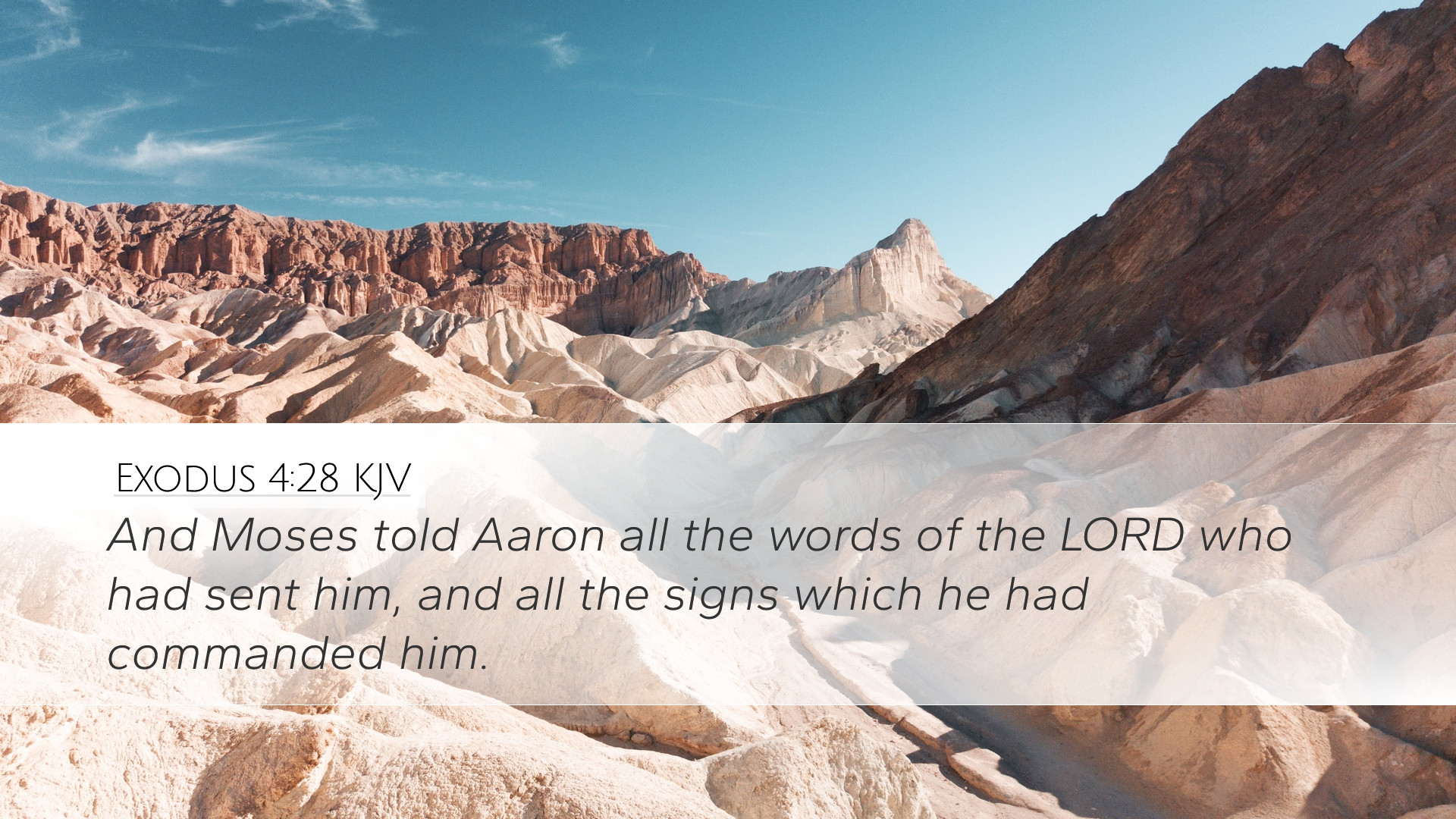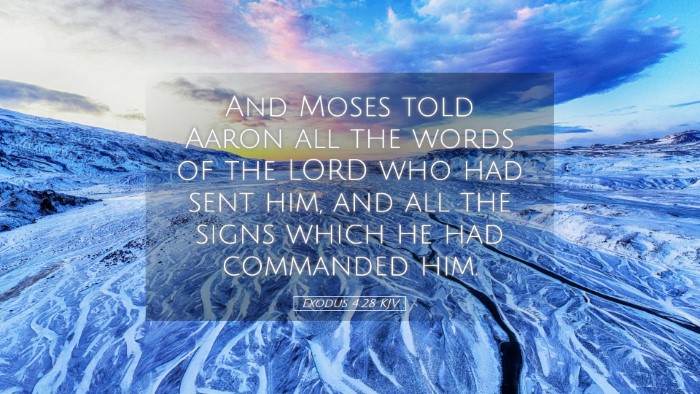Commentary on Exodus 4:28
Verse Context: Exodus 4:28 reads: "And Moses told Aaron all the words of the LORD who had sent him, and all the signs which He had commanded him." This verse serves as a significant transitional moment in the narrative of Exodus, indicating the crucial partnership between Moses and Aaron as they are commissioned for their divine task.
Significance of Moses' Communication
Moses' Role as a Messenger: According to Matthew Henry, this verse emphasizes the role of Moses not merely as a leader but as a messenger of God's Word. The act of relaying all that God had commanded him signifies his obedience and faithfulness. Henry notes that Moses fully embraced his mission, ensuring that Aaron would be informed and ready to assist him.
Divine Command and Human Response: Albert Barnes elaborates on the importance of Moses conveying every detail as instructed by the Lord. It reflects the seriousness of divine commands and the necessity for humans to respond appropriately. The thoroughness of Moses' communication showcases the completeness of God’s message and the expectation of faithful execution by His chosen instruments.
The Partnership of Moses and Aaron
Collaboration in Leadership: Adam Clarke highlights the critical partnership between Moses and Aaron. Moses, chosen by God, was to lead the Israelites out of slavery; however, he was also given the privilege of sharing this burden with his brother. Clarke points out that this dynamic illustrates how God often uses collaborative efforts in His divine plans. The unity between Moses and Aaron becomes a model for Christian ministry where working together in service reflects the unity of the Spirit.
Encouragement and Support: Additionally, Moses' communication is seen as a means of encouragement. By sharing what God had instructed, Moses builds Aaron's faith and strengthens their bond in the mission ahead. This underlines the importance of open communication and support in ministry, reminding leaders of their role in uplifting one another.
The Signs of God’s Power
Authenticity of the Message: The mention of the signs in this verse shows God's intention to authenticate the message that Moses would deliver to Pharaoh. Henry notes that these signs were not merely tricks; they were purposeful demonstrations of God’s power designed to convince both the Israelites and their oppressors. Hence, Moses relaying these signs represents an assurance that God is actively involved in their liberation.
- Signs as Divine Evidence: Clarke discusses the significance of signs and wonders in the biblical narrative, suggesting that they serve as evidence of God’s authority. They were intended to instill fear in Pharaoh and encourage trust among the Israelites.
- Faith and Action: Barnes emphasizes that these signs required faith; they were not simply for spectacle but were meant to galvanize both Moses and Aaron to take bold action in leading the Israelites out of captivity.
Theological Reflections on Leadership
God’s Sovereignty: A theological perspective emerges when considering how God orchestrates human affairs through leadership. Moses and Aaron’s initial obedience symbolizes the broader truth that God sovereignly directs history. Henry notes the implications of leadership being founded on divine appointment rather than personal merit or wisdom.
Preparation and Empowerment: Clarke also stresses the idea that before undertaking a monumental task, leaders must be well-prepared. Moses received direct instruction, highlighting that effective ministry originates from moments of divine encounter and preparation.
Application for Modern Ministry
Communication in Leadership: From this verse, pastors and ministers can learn the importance of clear and thorough communication. Just as Moses conveyed God’s commands to Aaron, contemporary leaders must ensure their congregations understand the vision and mission entrusted to them.
Unity in Ministry: The partnership modeled in this text serves as a reminder of the value of collaboration in ministry. Working alongside fellow believers fosters an atmosphere of shared responsibility and mutual support.
Dependence on Divine Confirmation: Lastly, the reliance on God’s signs illustrates the necessity of seeking and recognizing God’s work in our ministries. Leaders should regularly look for God’s affirmations and empowerments in their efforts, trusting in His ability to perform the extraordinary through them.
Conclusion
Exodus 4:28 encapsulates the beginning of a profound journey in which God chooses human instruments to fulfill His redemptive plan. The insights drawn from public domain commentaries serve to underscore the dynamics of leadership, collaboration, and divine empowerment inherent in Moses' and Aaron's mission. As we reflect on their commission, may we be inspired to embrace our own God-given assignments with fidelity, unity, and a deep reliance on the signs of God's enduring presence and power.


